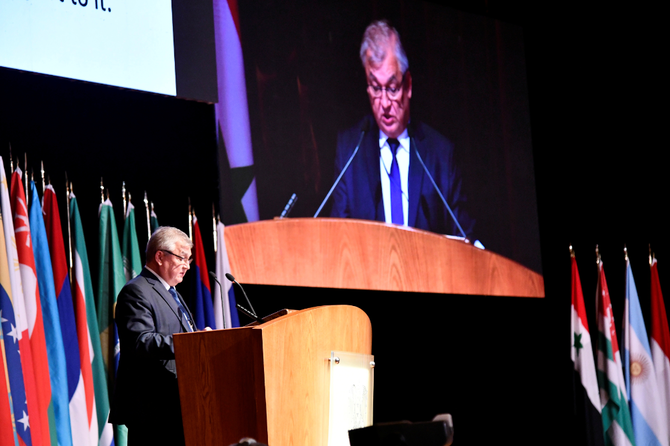NEW YORK: The US State Department on Thursday dismissed as a distraction a Russian-backed conference in Damascus that called for the return of millions of Syrian refugees to the war-ravaged country.
Richard Albright, deputy assistant secretary at the Bureau of Population, Refugees and Migration, said it is no more than a show that bears no relation to the grim reality of the situation in Syria.
Joel Rayburn, the US special envoy for Syria, said the conference was “just a dog and pony show meant to distract from the fact that the Russians and the Assad regime have not done what the international community has been pressing them to do, which is to end the war and move to a political solution under UN Security Council resolution 2254.”
During the joint briefing, Albright also accused Russia and the Syrian regime of using refugees as “political pawns” to lend legitimacy to the regime.
“This blatant disregard for the lives at stake is reprehensible,” he said, pointing out that the position of the UN is that conditions in Syria are not yet conducive to the safe and sustainable return of refugees.
“The few returns that have taken place have all too often been met with secondary displacement, continued dependence on international assistance and, in some cases, forced conscription, detention, forced disappearances and other human-rights violations,” Albright added.
“Displaced Syrians know this, and that’s why they’re not going back.”
The briefing came as the conference in Damascus entered its second day, with the aim of facilitating the return home of millions of people displaced by the Civil War. Syrian President Bashar Assad said in a televised speech that they “want to return home” but fear “terrorists and jihadists.”
Since the war began in 2011, more than half of the Syrian people have fled their homes. Millions are now refugees in other countries.
Albright said that a million Syrians were displaced by a regime offensive between December 2019 and February this year. This was “a pace of displacement faster than at any other time in the nine-year conflict,” he added,
“The Syrian government has a choice,” said Rayburn. “They can either take irreversible steps toward a peaceful resolution of this nearly decade-long conflict, or they can face further crippling sanctions and diplomatic isolation.”
On Nov. 9, the US administration implemented the fifth tranche of its Caesar Act sanctions, targeting Syrian military commanders, MPs, senior government figures and financiers. A total of 94 individuals and entities have been blacklisted since the first sanctions were announced in June.
The Caesar Act attracted overwhelming support from Democrats and Republicans in Congress, where it was backed by more than 500 of the 535 members.
“There’s a bipartisan mandate for the Syria policy that we have been executing, and that is unlikely to change,” Rayburn said.
Delegates at the conference in Damascus included representatives of 27 countries, including Iran, Venezuela and China. The UN and its organizations were not represented, nor were any of the major refugee-hosting countries.
“Some of the countries that joined (the conference) are the same ones that continue to kill and injure civilians in Syria, forcing millions to flee,” said Rayburn. “These countries falsely suggested that Syria is now safe for refugees to return.
“Russia and the Assad regime in particular are seeking to raise funds for rebuilding a Syria that they themselves are responsible for destroying, while the Assad regime continues to fund military operations — at many millions of dollars a month — against its own citizens, and the Syrian regime is continuing to disappear Syrians who do return to areas under the regime’s control.”
Asked by Arab News what effects the US sanctions are having on the Syrian regime, Albright said they have damaged its “ability to mask the resources that it’s been using to attack and keep a stranglehold on the Syrian people.”
He added: “The impact has been quite deep on the Assad regime; the leaders at the top are desperate to get out from under the sanctions’ pressure. They are worried that it will continue to build.”
Rayburn said the US campaign of political and economic pressure is being carried out in concert with the EU, and vowed that the diplomatic and economic isolation of the Syrian regime will continue until a political solution is implemented, based on UN Security Council resolutions.
“We simply think you can’t have political reconciliation without accountability for what has happened,” he added. “Until there’s accountability and justice, there cannot be meaningful discussions around refugee returns.”
Rayburn also warned that “any attempt to reestablish or upgrade relations with the Syrian regime without addressing (its) atrocities undercuts efforts to promote accountability and move toward a lasting, peaceful and political solution to the Syrian conflict.”
















